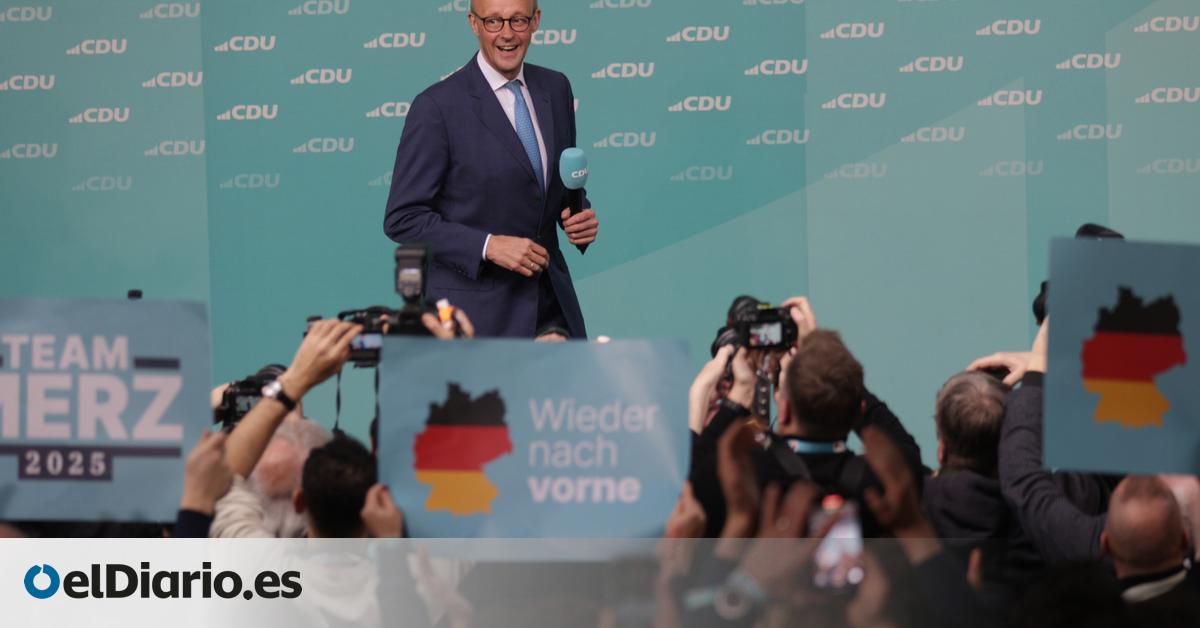
Right to the right in the most populous country and the largest economy of the European Union. The conservatives of the Christian Democratic Union (CDU), led by Friedrich Merz, have comfortably won in the general elections held this Sunday in Germany with 28.5% of the votes with their Bavarian brothers of the CSU, according to the results provisional
One of the great winners of the night is the ultra -right, which reaps a historical result in a elections in which the Germans have punished the parties that have been part of the unpopular government coalition that supported Olaf Scholz. The CDU will not have the majority and will need partners to govern, probably social democrats.
“We have won these elections,” Merz said in his first speech after knowing the conservative victory that, although it is baggy, is below 30% that the surveys predicted. “The world does not expect and either awaits us, or long and difficult coalition negotiations. We have to soon sit the bases for Germany to be well governed again. We celebrate it tonight, tomorrow morning we return to work. ”
This will be the Bundestag
Results of the elections in Germany 2025 and distribution of deputies in the German Parliament according to calculations of eldiario.es. Only the parties with more than 5% of the votes nationwide (list vote) or who have won at least 3 electoral districts in the candidate vote enter into the cast
Source: Bundestag, Germany Government
The ultra alternative for Germany shoots: it achieves its best result to date in national elections, double its numbers compared to 2021 and become the second game with the highest percentage of vote, 20.8%. On the back of a xenophobic and ultraconservative speech, the turbulent rise of ultra formation, partially qualified as extremist by secret services, shakes the German political board and threats to be emboldened to other radical right -wing parties in the European continent. With the growth of the parliamentary group, the party may expand its device and have more financing at your disposal than ever.
AFD also seals a record result for an ultra -right party in national election from the defeat of Nazism. In her electoral event, where good numbers have been received with an ovation, the AFD candidate, Alice Weidel, has spoken of a “historical success” and has struck Merz’s hand to negotiate a coalition, something that the conservative leader already He has previously ruled out and has repeated again this Sunday in the so -called ‘Round of Elephants’ on public television with all candidates.
Historical minimum for El SPD
Social democrats suffer a debacle and fall to third place with 16.4%, a historical minimum for the SPD that his candidate, Foreign Minister Olaf Scholz, has labeled “bitter” data. For this historical formation they are the worst results since the end of the 19th century. The Minister of Defense and possible successor of Scholz, Boris Pistorius, has branded the result of “devastating and catastrophic.” “There is no way to sweeten it,” said Pistorius, who says he is “willing to dialogue” with the CDU. In the television debate, Scholz has confirmed that he will not be part of a government with the conservatives, nor will he participate in the negotiations.
After the SPD there are their government partners, the Greens, who stay at 11.6% vote. Die Linke achieves 8.8% after a brilliant resurgence during the electoral campaign. The leftist formation has given the surprise in Berlin, where it has been the most voted force above the CDU.

The suspense has remained until the end of scrutiny, for the possible repercussions of the results of the small parties in parliamentary arithmetic and alliances.
After a projections dance, the self -styled ‘conservative’ of Alianza Sahra Wagenknecht (BSW) stays out of Parliament after not reaching the required threshold of 5% to sit there for just three tenths, according to the provisional results.
The FDP liberals are sprayed and do not exceed this barrier. The leader of the FDP, Christian Lindner, who was Minister of Finance of Scholz until the collapse of the Semaphore coalition, has announced in X his withdrawal of politics after the defeat of the Liberal Party.
The composition of Parliament is limited to 630 members after a reform of the electoral law. Without a majority, Merz will need to agree with other parties to be able to govern, almost with all probability, in a great coalition with the social democrats.
Merz has reiterated that he wants to form a government for Holy Week, and had assured that he preferred a single partner to two, in reference to the greens. “I will form a government that represents the entire population and I will strive to form a government that solves the problems of this country,” he said.
Possible pacts in Germany
Possible alliances and majorities in the Federal Parliament of Germany after the 2025 elections
The candidate of the Greens, Robert Habeck, had claimed to be willing to continue “assuming responsibility” of government. In this sense, he said that the greens are prepared for a so -called Kenyan coalition – for the colors of the flag and the matches (black, red, green) – with the CDU/CSU and the SPD. But, according to the results, the numbers give for a bipartite alliance, without ecoliberal formation.
Record participation
The CDU wins five percentage points compared to the latest federal elections. According to polls, most of them seem to come from the SPD, followed by the FDP, in addition to ancient abstentionists. AFD is consolidated in the East, in the territory of the extinct German Democratic Republic, where it is first force.
If the young electorate is observed, many turn their backs on the center matches. About 45% of young voters have chosen matches located at the extremes of the political spectrum: 25% opted for Die Linke, while 20% opted for the Ultradechist AFD, according to the projected results.
The participation in the general elections of Germany amounted to between 83% and 84%, according to the forecasts of public television chains ARD and ZDF, which means the highest figure since the country’s reunification in 1990.
The Germans have gone to the polls after a campaign crossed by immigration and economy as central themes. The mood was pessimistic. According to an ARD survey, in the week before the elections, 83% of the interviewees saw with concern the situation of the country, while only 12% felt confidence.
Economic and geopolitical challenges
Converted into a kind of chancellor waiting, the leader of the CDU has ruled out any alliance with the ultra -right, on which a “sanitary cordon” of the rest of political formations governs. “We have divergent visions in foreign policy, security, with respect to NATO. Everything they want can reach out for us, but we will not fall into a wrong policy, ”Merz told Weidel this Sunday.
But this consensus in German politics has cracks: in the campaign, the conservative leader broke the taboo on the collaboration of the ultra -right by tolerating AFD’s votes in a non -binding parliamentary motion that called to harden immigration policy.
Merz took the reins of the party after the resounding failure in the 2021 elections. Historic rival of his predecessor, Angela Merkel, has opted for a return to a traditional conservative line, after years of displacement to the center under the ex -chancellor. Without an experience of government and economic liberal, he is a lawyer and became a millionaire with his career in the business world, during which he came to work for Blackrock, one of the world’s largest investment funds.
As a chancellor, Merz will have to deal with an economy that drags two years in recession and a convulsive geopolitical moment, with the presidency of Donald Trump shaking the transatlantic relationship. The leader of the admitted CDU himself that Germany faces “tectonic changes in the centers of political and economic power of the world.”
Germany advanced the elections after the collapse of the tripartite alliance formed by social democrats, green and liberals that support Olaf Scholz at the head of the government. In November last year, the Foreign Minister dismissed a Christian Lindnerafter a bitter budget dispute that lasted months. Scholz deliberately summoned a motion of confidence in Parliament to lose it, What finally It happened and raided the way to advance the general elections.
Source: www.eldiario.es

